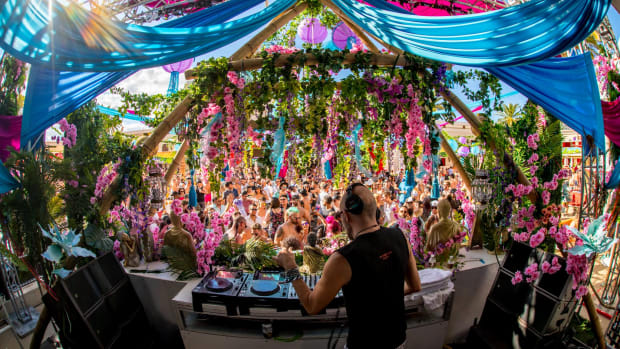
The organic house genre rose in popularity as labels like Anjunadeep, All Day I Dream, and Where The Heart Is began championing the sound of softer, texturally-driven music.
The style gained its first real traction in the community-facing festivals like Burning Man, Lightning In A Bottle, Desert Hearts, and All Day I Dream.
While Organica was slowly gaining in popularity, the genre title was slowly being rotated; being named Playa Tech, Melodic Deep House, and others. It wasn't until Beatport brought the official title of 'Organic House' to its site did the world finally settle on a name for it.
Check Out - How EDM Eats Itself
The warmer, softer tones of organic house make them more suitable for summertime parties and daytime gatherings, where the momentum of standard club music is taken by slower tempos, softer melodies, and far more listful percussions.
TL;DR – Organic House is perfect for day parties and features way groovier, flowy types of music than conventional deep house.
ORGANIC HOUSE DJS
Chris Luno
Tim Green
Fulltone
Sebastien Leger
David Hohme
Drelirium
WHAT BPM IS ORGANIC HOUSE?
Organic House is very 'vibe-centric,' and tempos can differ; even in a single DJ set.
On the low end, DJs like Satori produce Organic House tracks that hover around 110 BPM, creating a very tantric and swaying vibe in their sets.
While acts like Satori and others' tempos are on the low end of the BPM range, you would be hard-pressed to find many DJs playing tracks above 126bpm.
Because Organic House is all about the laidback and easily listenable energy, and anything more uptempo from that and you're in the fist-pumping range...
Looking For Something More Uptempo? Check What WTF Is Future Rave!

WHAT EXACTLY IS 'ORGANIC HOUSE?'

The 15 Best Indie Dance Songs of May 2022

2022's Most Anticipated Rap Album Releases
So it's safe to say that real upper ceiling of Organic House tempos are around 124 BPM, which is just slow enough to provide a danceable groove without breaking a sweat (unless of course the sun is the cause of it).
WHAT IS THE DIFFERENT BETWEEN ORGANIC HOUSE AND DEEP HOUSE?
Much like the more conventional genres of house music, Organic House still emphasizes the drums and the grooves. But it has some marked differences that make organic house vs. deep house appear night and day.
Firstly, the grooves and percussions of deep house are far more pounding and aggressive. The massive kick and other percussions consisting of a few choice percussion hits mean that every drum hit has a space to create impact; each hit packs a ton of punch.
But the grooves of organic house tracks are far different...
The grooves of Organic House are far more layered, meaning oftentimes no single drum hit sticks out from the rest, and instead, a flurry of layered percussion creates a complex groove that the softer melodies float on top of.
Secondly, and most importantly to the overall vibe, in my opinion, is the far different use of instruments and sound choice overall.
While both deep house and organic house put the groove on the record at
WHAT INSTRUMENTS MAKE UP ORGANIC HOUSE?
As mentioned above, Organic House thrives on acoustic instrumentation.
Sure, many of the lead sounds in a track may be synthesized with digital instruments. But the ear candy elements, supporting harmonies, and more will be comprised of sitars, strings, upright basses, and vocal lines.
The atmospheres play such a monumental part in any organic house track, that producers treat the atmospheric sounds and background noises with almost as much attention as the instruments themselves. Complex foley noises, vinyl crackles, and field recordings bring an all-natural character to Organic House tracks and help fill out their other sparse arrangements.
HOW TO PRODUCE ORGANIC HOUSE
Producing professional-level Organic House is all about attention to detail and nuance, and it all comes down to making the tiniest of tweaks and adjustments compared to more straightforward genres of electronic music.
And while the entire process of this goes beyond the scope of this article, our friends over at Make Your Transition did it better than we ever could.





